
Math I Unit 3 Geometry © 2005 Learning Concepts
Mathematics I
Unit 3 - Geometry
Concept 3 - Triangle Points of Concurrency
Plan for the Concept, Topic, or Skill – Not for the Day
Session#1
Essential Question:
1. How can I find points of concurrency in triangles?
2. How can I use points of concurrency in triangles?
Activating Strategies: (Learners Mentally Active)
Using the Construction Graphic Organizer, students will construct a median,
angle bisector, perpendicular bisector, and an altitude to review previously taught
constructions from 7
th
grade GPS curriculum. This activity is teacher directed and
should not be considered re-teaching these constructions, but refresh their
memory of tasks previously mastered so the incenter, orthocenter, circumcenter,
and centroid can be constructed later. Through class discussion students will
define median, angle bisector, perpendicular bisector, and altitude, construct
each, and then tell how they constructed it.
Acceleration/Previewing: (Key Vocabulary)
Vocabulary: incenter, orthocenter, circumcenter, centroid
These words will be defined through discovery via the Amusement Park Task
(Questions # 1 thru 4).
Below pictures are courtesy of http://intermath.coe.uga.edu/dictnary
Incenter – The point of concurrency of the bisectors of the angles of a triangle.

Math I Unit 3 Geometry © 2005 Learning Concepts
Orthocenter - The point of concurrency of the altitudes of a triangle.
Circumcenter - The point of concurrency of the perpendicular bisectors of the
sides of a given triangle.
Centroid - The point of concurrency of the medians of a triangle.

Math I Unit 3 Geometry © 2005 Learning Concepts
Teaching Strategies: (Collaborative Pairs; Distributed Guided Practice;
Distributed Summarizing; Graphic Organizers)
Amusement Park Task
Students will work in groups of three and designate themselves as Student A,
Student B, and Student C. Lead class discussion of Amusement Park Handout
#1.
Next, distribute all 4 triangle worksheets (Amusement Park Handouts 2 thru 5).
Students will follow the directions on each triangle worksheet to make the
following constructions: median, angle bisector, perpendicular bisector, and an
altitude. They should incorporate the previously completed Construction Graphic
Organizer and the teacher role should be that of a facilitator during this task.
Student are completing these constructions simultaneously within their
groups, please direct their attention to the directions so that each student
understands which triangle he/she will lead. Give students an opportunity to
choose between various tools – patty paper, MIRA, compass and straight edge,
and Geometer’s Sketchpad. Students can use a different tool for each of your
construction.
Once constructions are completed, a whole class discussion should be lead as
follows:
Hopefully in each case you have noticed that there is a point of intersection (a
point of concurrency) that occurs. This is an important property of constructions
within triangles and one that solves many problems in mathematics.
Distribute Handout #6 to complete this task. It may be necessary for students to
complete as homework.
Distributed Guided Practice/Summarizing Prompts: (Prompts Designed to
Initiate Periodic Practice or Summarizing)
How is a perpendicular bisector like a median? How is it different?
How is a perpendicular bisector like an altitude? How is it different?
How is a perpendicular bisector like an angle bisector? How is it different?
Summarizing Strategies: Learners Summarize & Answer Essential
Question
As a ticket out the door (or homework assignment if time does not permit),
complete the COMPARE AND CONTRAST Segments Involved in Triangle
Constructions.
Give students an example of what should go on the sheet, “ The perpendicular
bisector is similar to the median because it intersects a side of the triangle at its
midpoint.” “A perpendicular bisector is different from an altitude because it

Math I Unit 3 Geometry © 2005 Learning Concepts
intersects a side of the triangle at its midpoint while an altitude may not.”
Session #1: Materials Needed:
Needed – Compass and Straight Edge, color pencils
Suggested – MIRA, patty paper, Geometer’s Sketchpad

Math I Unit 3 Geometry © 2005 Learning Concepts
Name:_________________________________________________________ Period_____________________ Date:_____________________
COMPAREANDCONTRASTSegmentsInvol vedinTriangleConstructions
Based on the constructions and the Construction Graphic Organizer completed in class, how are all these construction alike and how are they all
different?
Perpendicular Bisector
Altitude
Median
Angle Bisector
Characteristics that are similar:
1.
2.
3.
4.
1.
2.
3.
4.
1.
2.
3.
4.
1.
2.
3.
4.

Math I Unit 3 Geometry © 2005 Learning Concepts
Characteristics that are different:
1.
2.
3.
4.
1.
2.
3.
4.
1.
2.
3.
4.
1.
2.
3.
4.
Can one segment have all the characteristics? Under what circumstances?

Math I Unit 3 Geometry © 2005 Learning Concepts
Construction Graphic Organizer
Type of
Construction
Definition Construction How I constructed it
Median
Angle
Bisector
Perpendicular
Bisector
Altitude
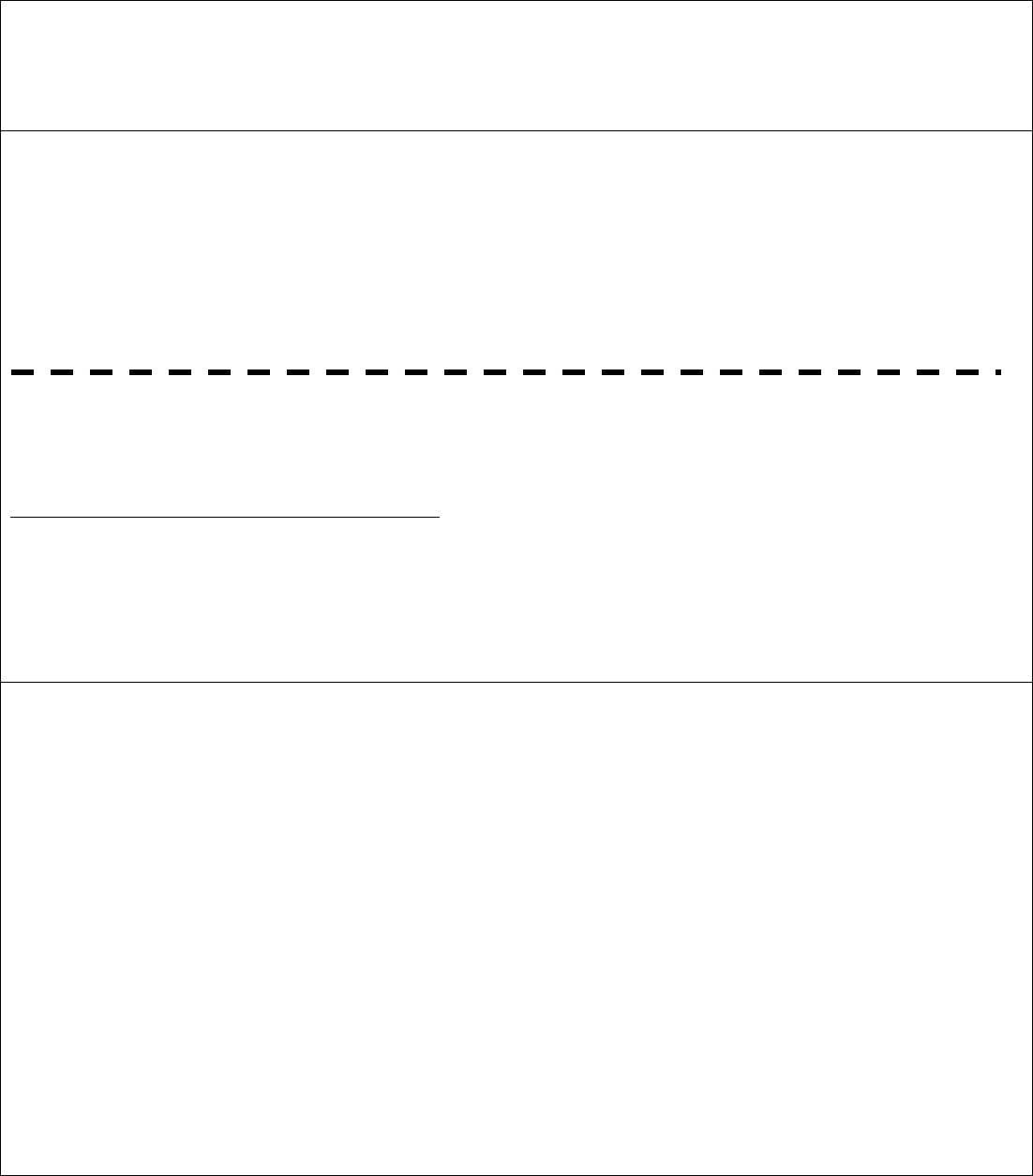
Math I Unit 3 Geometry © 2005 Learning Concepts
Mathematics I
Unit 3 - Geometry
Concept 3 - Triangle Points of Concurrency
Plan for the Concept, Topic, or Skill – Not for the Day
Session#2
Essential Question:
3. How can I find points of concurrency in triangles?
4. How can I use points of concurrency in triangles?
Activating Strategies: (Learners Mentally Active)
Warm-Up:
Please match the following prefixes to their correct meaning:
1. In a. center
2. Centr b. around
3. Circum c. in, into
4. Ortho d. straight, correct
Answers: 1 – C, 2 – A, 3 – B, 4 - D
Acceleration/Previewing: (Key Vocabulary)
Vocabulary: incenter, orthocenter, circumcenter, centroid
Notes for the teacher about this vocabulary: (keep this in mind throughout today’s lesson)
• Orthocenter can lie inside and outside of a triangle.
• Incenter always lies inside the triangle.
• Centroid always lies inside the triangle. Also note that this is the point of balance for the triangle.
• Circumcenter can lie inside the triangle, on the triangle, or outside the triangle.
• Anything that involves an altitude may lie outside of the triangle.
Teaching Strategies: (Collaborative Pairs; Distributed Guided Practice; Distributed
Summarizing; Graphic Organizers)
Amusement Park Task (Continued)
Reassemble the same groups from the previous lesson and ask them to pull out the handouts and
constructions from the previous day to refer to.
Distribute Amusement Park Handout page # 7.
Have students answer question #6 and then discuss it.
Have students fill in the blanks on the worksheet using the word bank. Remind them to think about
the Warm-Up and what the prefixes meant.
The teacher should summarize and clarify these definitions.
Have students answer questions #7, 8, and 9. Discuss their answers after students have had time to
complete the questions.
(You may have to assign #9 as homework if you run out of time)
4 Segments in a Triangle Graphic Organizer
Please pass this graphic organizer out to students. Think-Pair-Share this graphic organizer. Give
students five to six minutes to fill in their organizer and then four to five minutes to share with their
partner. If students did not draw examples of each point of concurrency in the appropriate area,

Math I Unit 3 Geometry © 2005 Learning Concepts
please allow them time to do so.
CellPhoneTowerTask
Pass out either Cell Phone Tower Task Option A or Option B to each student. (Option B has a little
more direction about what they need to do to solve the problem.)
Allow students to work in groups, pairs, or individually on this task. The teacher should serve as
facilitator as students work. Students should finish the task for homework if not completed in class.
Distributed Guided Practice/Summarizing Prompts: (Prompts Designed to Initiate Periodic
Practice or Summarizing)
What does the word concurrency mean?
What is the difference between the centroid, circumcenter, incenter, and orthocenter of a triangle?
How are the centroid, circumcenter, incenter, and orthocenter of a triangle alike?
Summarizing Strategies: Learners Summarize & Answer Essential Question
As a ticket out the door, have students answer the following questions in complete sentences:
1. Does the centroid always lie inside the triangle?
2. Does the incenter always lie inside the triangle?
3. Does the circumcenter always lie inside the triangle?
4. Does the orthocenter always lie inside the triangle?
5. Can these points ever coincide?
Session #2: Materials Needed:
Needed – Compass and Straight Edge, color pencils
Suggested – MIRA, patty paper, Geometer’s Sketchpad

Math I Unit 3 Geometry © 2005 Learning Concepts
Four Segments in Triangle Name__________________________
bisector⊥
Altitude
Median
AngleBisectors
-
-
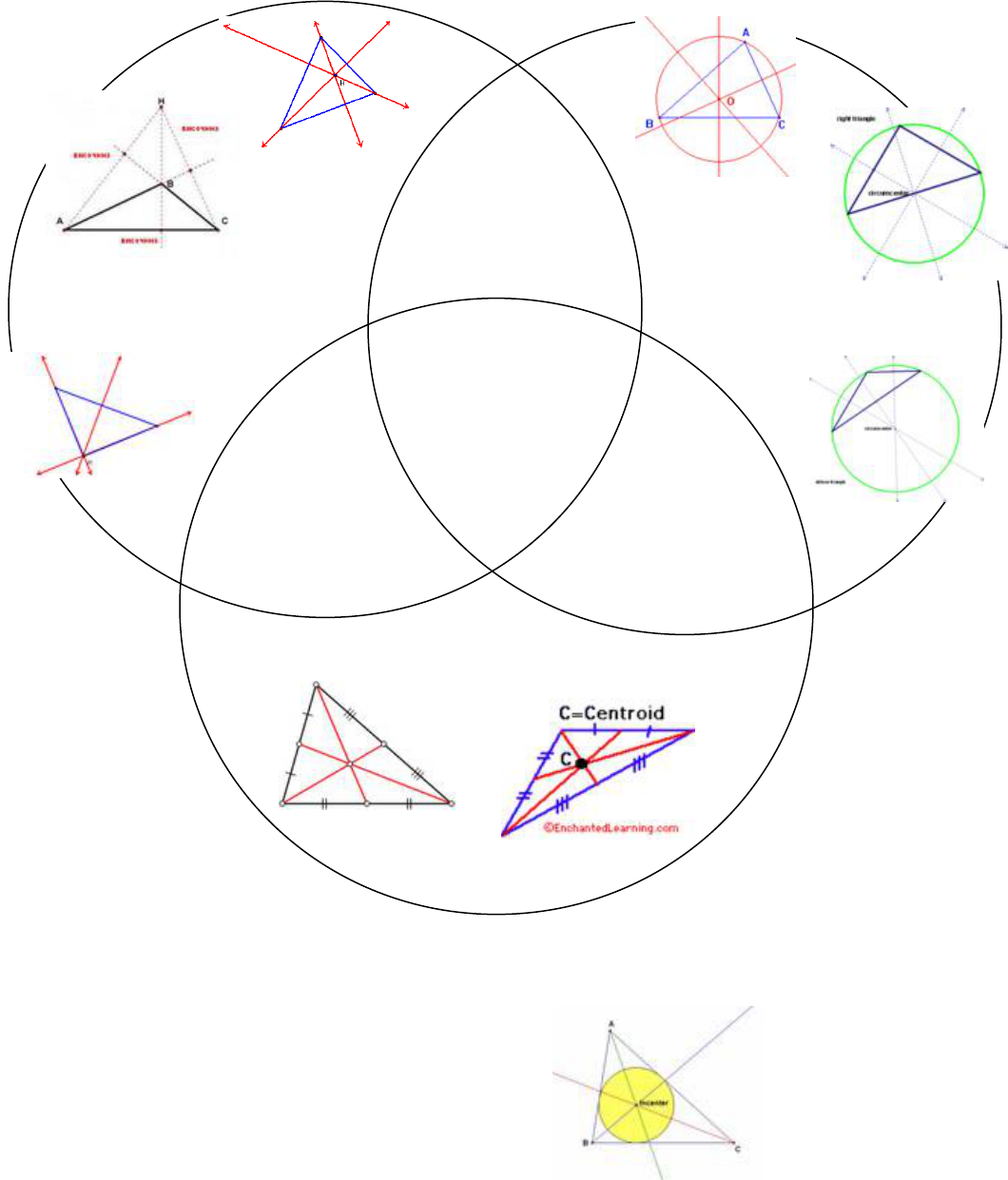
Math I Unit 3 Geometry © 2005 Learning Concepts
Four Segments in Triangle Name__________________________
bisector⊥
Altitude
⊥
to
side of
triangle
Centroid
Orthocenter
Circumcenter
3 Segments
Concurrent
at a
point
Passes
through
vertex
Bisects
side of
triangle
Median
Angle Bisectors
• bisect angles
• concurrent at incenter
Math I Unit 3 Geometry © 2005 Learning Concepts
Cell Phone Tower Task Option A
A cell service operator plans to build an additional tower so that more of the southern
part of Georgia has stronger service. People have complained that they are losing
service, so the operator wants to remedy the situation before they lose customers. The
service provider looked at the map of Georgia below and decided that the three cities:
Albany, Valdosta, or Waycross, were good candidates for the tower. However, some of
the planners argued that the cell tower would provide a more powerful signal within the
entire area if it were placed somewhere between those three cities. Help the service
operator decide on the best location for the cell tower.
Compose a memo to the president of the cell company justifying your final choice for
the location of the tower. Use appropriate mathematical vocabulary and reasoning your
justification.

Math I Unit 3 Geometry © 2005 Learning Concepts

Math I Unit 3 Geometry © 2005 Learning Concepts
Math I Unit 3 Geometry © 2005 Learning Concepts
Cell Phone Tower Task Option B
A cell service operator plans to build an additional tower so that more of the southern
part of Georgia has stronger service. People have complained that they are losing
service, so the operator wants to remedy the situation before they lose customers. The
service provider looked at the map of Georgia below and decided that the three cities:
Albany, Valdosta, or Waycross, were good candidates for the tower. However, some of
the planners argued that the cell tower would provide a more powerful signal within the
entire area if it were placed somewhere between those three cities. Help the service
operator decide on the best location for the cell tower.
1. Just by looking at the map, choose the location that you think will be best for building
the tower. Explain your thinking.
2. Now you are going to use some mathematical concepts to help you chose a location
for the tower. Using the 4 triangles attached that approximately represent the triangle
formed by Albany, Valdosta and Waycross, find the centroid, incenter, circumcenter,
and the orthocenter. You may choose from patty paper, MIRA, compass and straight
edge, and Geometer’s Sketchpad to make your constructions.
3. Choose a location for the tower based on the work you did for question #2. Explain
why you choose this point.
4. Compare the point you chose in question #3, based on mathematics, to the point
you chose in question #1, based on observation?
5. Compose a memo to the president of the cell company justifying your final choice for
the location of the tower. Use appropriate mathematical vocabulary and reasoning your
justification.

Math I Unit 3 Geometry © 2005 Learning Concepts

Math I Unit 3 Geometry © 2005 Learning Concepts
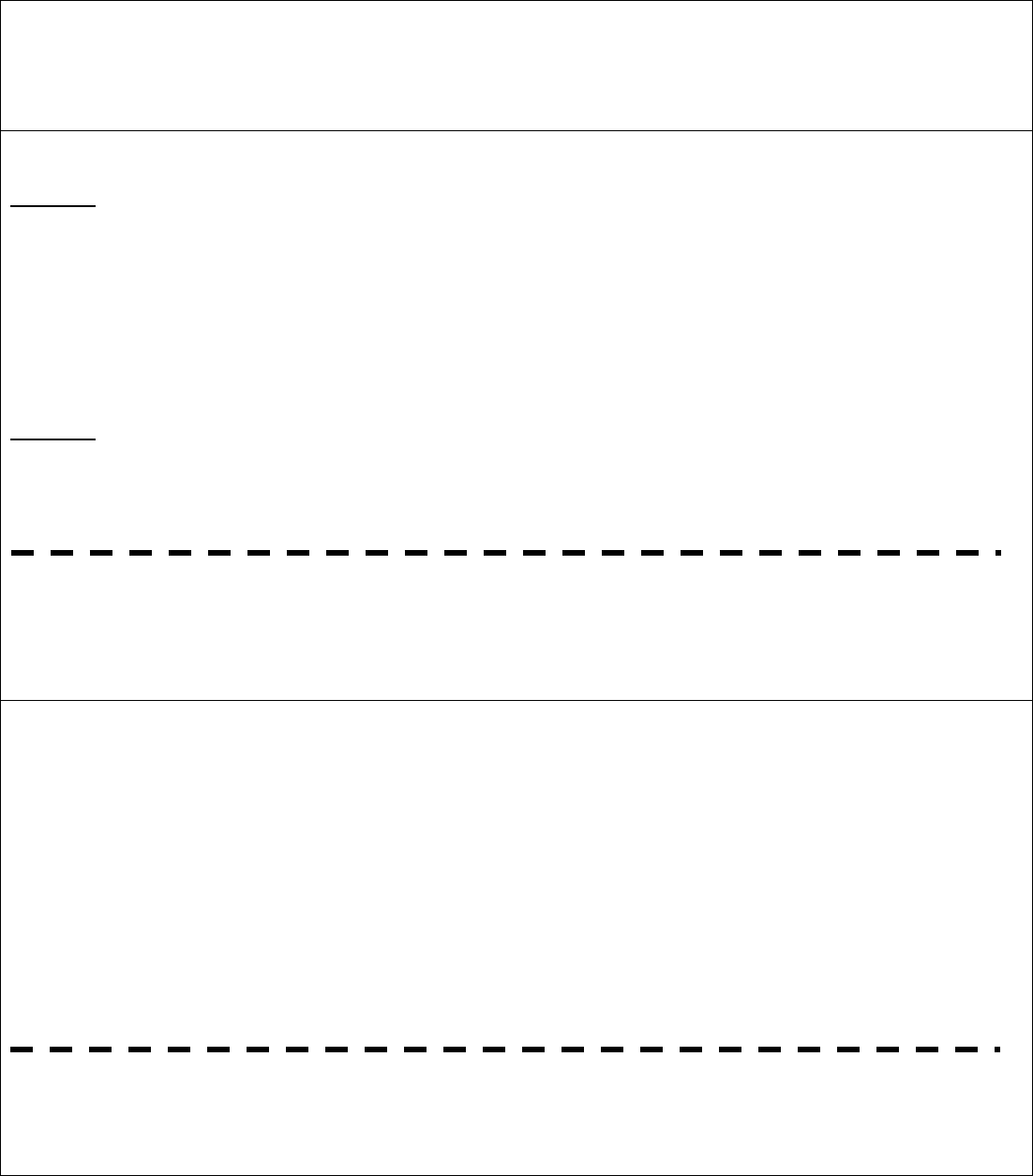
Math I Unit 3 Geometry © 2005 Learning Concepts
Mathematics I
Unit 3 - Geometry
Concept 3 - Triangle Points of Concurrency
Plan for the Concept, Topic, or Skill – Not for the Day
Session#3
Essential Question:
5. How can I find points of concurrency in triangles?
6. How can I use points of concurrency in triangles?
Activating Strategies: (Learners Mentally Active)
Option 1:
Fill in each blank with always, sometimes, or never.
1. The median of a triangle is ___________ the perpendicular bisector.
2. The altitude of a triangle is ___________ the perpendicular bisector.
3. The medians of a triangle ___________ intersect inside the triangle.
4. The altitudes of a triangle ____________ intersect inside the triangle.
5. The angle bisectors of a triangle ___________ intersect inside the triangle.
6. The perpendicular bisectors of a triangle ___________ intersect inside the triangle.
Option 2
Answer the following questions in complete sentences.
1. What is the difference between the centroid, circumcenter, incenter, and orthocenter of a triangle?
2. How are the centroid, circumcenter, incenter, and orthocenter of a triangle alike?
Acceleration/Previewing: (Key Vocabulary)
Vocabulary: incenter, orthocenter, circumcenter, centroid
Teaching Strategies: (Collaborative Pairs; Distributed Guided Practice; Distributed
Summarizing; Graphic Organizers)
Pass out the review worksheet and have students complete individually. After students have
completed the review, have students team up into pairs or small groups to check their work.
TheAirportProblemTask
Pass out the Airport Problem Task to students. Allow them to pair up and complete the task.
Time may not permit students to finish this task in class. Direct students to finish this at home tonight.
They will be allowed approximately 10 minutes tomorrow to get back with their partner to Think-Pair-
Share their solutions to this task and then turn in.
Distributed Guided Practice/Summarizing Prompts: (Prompts Designed to Initiate Periodic
Practice or Summarizing)
Will the orthocenter be a possible point we need to find for the Airport Problem? Why or why not?

Math I Unit 3 Geometry © 2005 Learning Concepts
Will the centroid be a possible point we need to find for the Airport Problem? Why or why not?
Summarizing Strategies: Learners Summarize & Answer Essential Question
As a ticket out the door, have students answer the following in complete sentences:
How do the points of concurrency in triangles solve problems?
Session #3: Materials Needed
Needed – Compass and Straight Edge, color pencils
Suggested – MIRA, patty paper, Geometer’s Sketchpad

Math I Unit 3 Geometry © 2005 Learning Concepts
The Airport Problem
A county plans to build a regional airport to serve its citizens and wants to locate it within easy access
of its three largest towns as shown on the map below. The county has two options for location of the
new airport and is working with the airport construction company to minimize costs wherever
possible. No matter where the airport is located, roads will have to be built for access directly to the
towns or to the existing highways.
20
18
16
14
12
10
8
6
4
2
5 10 15 20 25 30 3
5
miles
Hwy 100
Hwy 120
Hwy 140
Town C
Town B
Town A
Option A: Build the airport at a location that is equidistant from each of the three towns. If this option
is selected the county will have to pay for building new roads connecting the airport to the
three towns.
Option B: Build the airport at a location that is the shortest distance from each existing highway. If
this option is selected the county will have to pay for building new roads to each existing
highway and pay for resurfacing each existing highway from the point of intersection
leading into each town.
Cost for building new roads is $125,000 per mile.
Cost for resurfacing existing highways is $50,000 per mile.
Where is the most cost efficient location for the new airport?
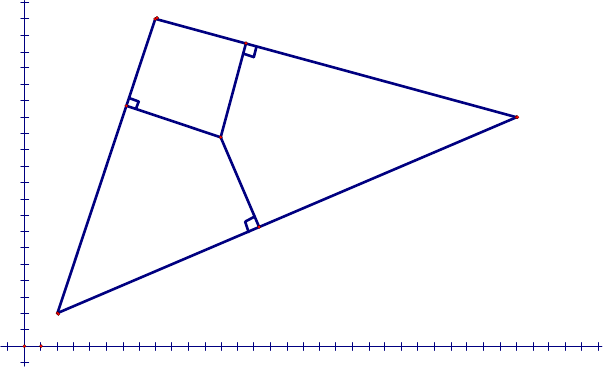
Math I Unit 3 Geometry © 2005 Learning Concepts
Option A
1. If Option A is selected, what construction would locate the point that is equidistant from the
three towns?
2. Construct the point and determine (estimate) the coordinates of the airport location.
3. New roads will need to be constructed from this location directly to each of the three towns.
Determine the distance from the airport location to each town.
4. Determine the cost for building the new roads.
Option B
20
18
16
14
12
10
8
6
4
2
5 10 15 20 25 30 3
5
miles
Hwy 100
Hwy 120
Hwy 140
A
irport
Town C
Town B
Town A
1. If Option B is selected, what construction would locate the point that is the shortest distance to
each of the three existing highways? The shortest distance from a point to a line is the
perpendicular distance.
2. Construct the point and determine (estimate) the coordinates of the airport location.
3. New roads will need to be constructed from this location directly to each existing highway.
a. Determine the points of intersection for each new road and existing highway.
b. Find the length of each new road.
c. Determine the cost for building the new roads.
Math I Unit 3 Geometry © 2005 Learning Concepts
4. If Option B is selected the county has also agreed to resurface the existing highways leading
from the airport roads to each town. Find the cost of resurfacing the existing highways.
5. What is the cost of Option B?
6. Which option is the most cost efficient for the airport location?
7. Based on your investigation can you suggest a better solution for the county in terms of saving
money on road construction? If so, how could you prove this to the county as a money saving
option?

Math I Unit 3 Geometry © 2005 Learning Concepts
Airport 2 (Alternate Task)
The same airport construction company has been hired in a neighboring county to construct a
regional airport, this time with some new restrictions. The county wants the airport to be located as
close as possible to all three towns, but closest to the largest town, Town S. Three engineers (who
happen to be very good mathematicians) suggest that they build the site on the center of concurrency
of the triangle formed by the 3 towns, but arguments ensue.
One engineer thinks that the centroid
of the triangular region would be best, another says that the
orthocenter
would be optimal, the third said that that the circumcenter of the triangular region would
be the best location.
14
12
10
8
6
4
2
-10 -5 5 10 15
K
S
U
1. Which of these airport location points would be closest to Town S?
2. Estimate the distance from each of the three towns
3. What do you notice about all 3 points of concurrency in this triangle? Will this always be true?
Draw another triangle and construct the orthocenter, centroid, and circumcenter. Are the
results the same? It should be! The line that passes thru those 3 points in a triangle are called
the Euler (pronounced “Oiler”) line.
4. In this particular situation which point is closest to Town S? Will this always be true? Explore
some different triangles to see if there is a rule that will allow you to know which point of
concurrency will be closer to a specific point? Try a triangle with coordinates the same as K
and U but with S(0,20). Then try changing the coordinates of K and U.
5. Based upon road construction/resurfacing prices mentioned previously which site would be the
most cost efficient for the county?
Math I Unit 3 Geometry © 2005 Learning Concepts
Conclusions:
What are the centroid, the incenter, the circumcenter, and the orthocenter of a triangle?
How do the points of concurrency in triangles solve problems?

Math I Unit 3 Geometry © 2005 Learning Concepts
Homework:
The Circle Challenge
Dutch is creating a circular garden to be surrounded by a stone fence in his backyard. He has just planted 3
trees that will stand at the edge of the stone fence as shown. He also needs to determine the size of the circular
garden so he can plan a budget for the project. Dutch decided to make a scale drawing of his plans as shown in
the diagram. Each unit represents one meter.
18
16
14
12
10
8
6
4
2
-2
5 10 15 20 25
Tree A
Tree B
Tree C
1. How can Dutch find the center of the circle for his garden?
2. Construct the circle that would represent the stone fence.
3. What coordinate point represents the center of the circle? (Estimate)
4. What is the radius of the circle?
5. Dutch knows that it will cost $8.00 per meter to build his fence. How much should this cost?

Math I Unit 3 Geometry © 2005 Learning Concepts
Target Practice
Michael is in charge of this year’s dart tournament at the local recreation center. Instead of using a circular
dartboard he decided that it would be interesting to use a square dartboard with a triangle shaped center as
shown below. Points are awarded based upon how close the dart is to the centroid of the triangle. The centroid
is the point of concurrency of the medians of a triangle.
-2
0
-1
0
1
0
2
0
1
5
1
0
5
-
5
-1
0
-1
5
I
D
C
B
A
J
H
1. What coordinate point represents the centroid of the triangle? Explain how you determined this.
2. The following table shows how points are awarded in this game:
Position of dart Points
Inside square 5
Inside triangle 10
Within a 5 unit radius from the centroid
of the triangle
25
What is the probability of hitting:
a. inside the triangle?
b. within a 5 unit radius from the centroid of the triangle?
3. Michael scored 70 points during his first time up. Assuming he hit the dart board each time, what
possible hits could he have made?
See also Burn Center task from GPS Math 1 Framework.

Math I Unit 3 Geometry © 2005 Learning Concepts
Mathematics I
Unit 3 - Geometry
Concept 3 - Triangle Points of Concurrency
Plan for the Concept, Topic, or Skill – Not for the Day
Session #3 1/2
Essential Question:
7. How can I find points of concurrency in triangles?
8. How can I use points of concurrency in triangles?
Activating Strategies: (Learners Mentally Active)
Students are to pair up into their pairs from the previous day. Allow them 10 minutes to Think-Pair-
Share their solutions to the Airport Problem Task. When time is up, have students turn their papers in
together as a pair.
Acceleration/Previewing: (Key Vocabulary)
Vocabulary: incenter, orthocenter, circumcenter, centroid
Teaching Strategies: (Collaborative Pairs; Distributed Guided Practice; Distributed
Summarizing; Graphic Organizers)
Pass out quiz over Triangle Points of Concurrency.
Allow students approximately 20 minutes to complete.
Begin the next concept in this unit.
Distributed Guided Practice/Summarizing Prompts: (Prompts Designed to Initiate Periodic
Practice or Summarizing)
Not applicable.
Summarizing Strategies: Learners Summarize & Answer Essential Question
Not applicable.
Session # 3 ½: Materials Needed
None Needed
Math I Unit 3 Geometry © 2005 Learning Concepts
Points of Concurrency in Triangles Quiz
Unit 3
1. The incenter of a triangle can be found by constructing the _________________ of that triangle.
a. Medians
b. Perpendicular bisectors
c. Angle bisectors
d. Altitudes
2. The orthocenter of a triangle can be found by constructing the ______________ of that triangle.
a. Medians
b. Perpendicular bisectors
c. Angle bisectors
d. Altitudes
3. The centroid of a triangle can be found by constructing the _________________ of that triangle.
a. Medians
b. Perpendicular bisectors
c. Angle bisectors
d. Altitudes
4. The circumcenter of a triangle can be found by constructing the _____________ of that triangle.
a. Medians
b. Perpendicular bisectors
c. Angle bisectors
d. Altitudes
Math I Unit 3 Geometry © 2005 Learning Concepts
Thoroughly answer the following questions using complete sentences.
5. In your own words, explain key similarities and differences between all four points of concurrency for
triangles.
6. Describe a real-world application in which an understanding of concurrency in triangles would be an
useful problem solving tool.

Math I Unit 3 Geometry © 2005 Learning Concepts
Triangle Points of Concurrency Teacher Notes
• Orthocenter can lie inside and outside of a triangle.
• Incenter always lies inside the triangle.
• Centroid always lies inside the triangle. Also note that this is the point of balance for the triangle.
• Circumcenter can lie inside the triangle, on the triangle, or outside the triangle.
• Anything that involves an altitude may lie outside of the triangle.
HelpfulTheorems
• Concurrency of Angle Bisectors of a Triangle – The angle bisectors of a triangle intersect at a
point that is equidistant from the sides of the triangle. PD = PE = PF
• Concurrency of Medians of a Triangle – The medians of a triangle intersect at a point that is two
thirds of the distance from each vertex to the midpoint of the opposite side. If P is the centroid of
triangle ABC, then AP=
3
2
AD, BP =
3
2
BF, and CP =
3
2
CE.

Math I Unit 3 Geometry © 2005 Learning Concepts
• Concurrency of Perpendicular Bisectors of a Triangle – The perpendicular bisectors of triangle
intersect at a point that is equidistant from the vertices of the triangle. PA = PB = PC

Math I Unit 3 Geometry © 2005 Learning Concepts Math I Unit 3 Geometry © 2005 Learning Concepts

Math I Unit 3 Geometry © 2005 Learning Concepts Math I Unit 3 Geometry © 2005 Learning Concepts
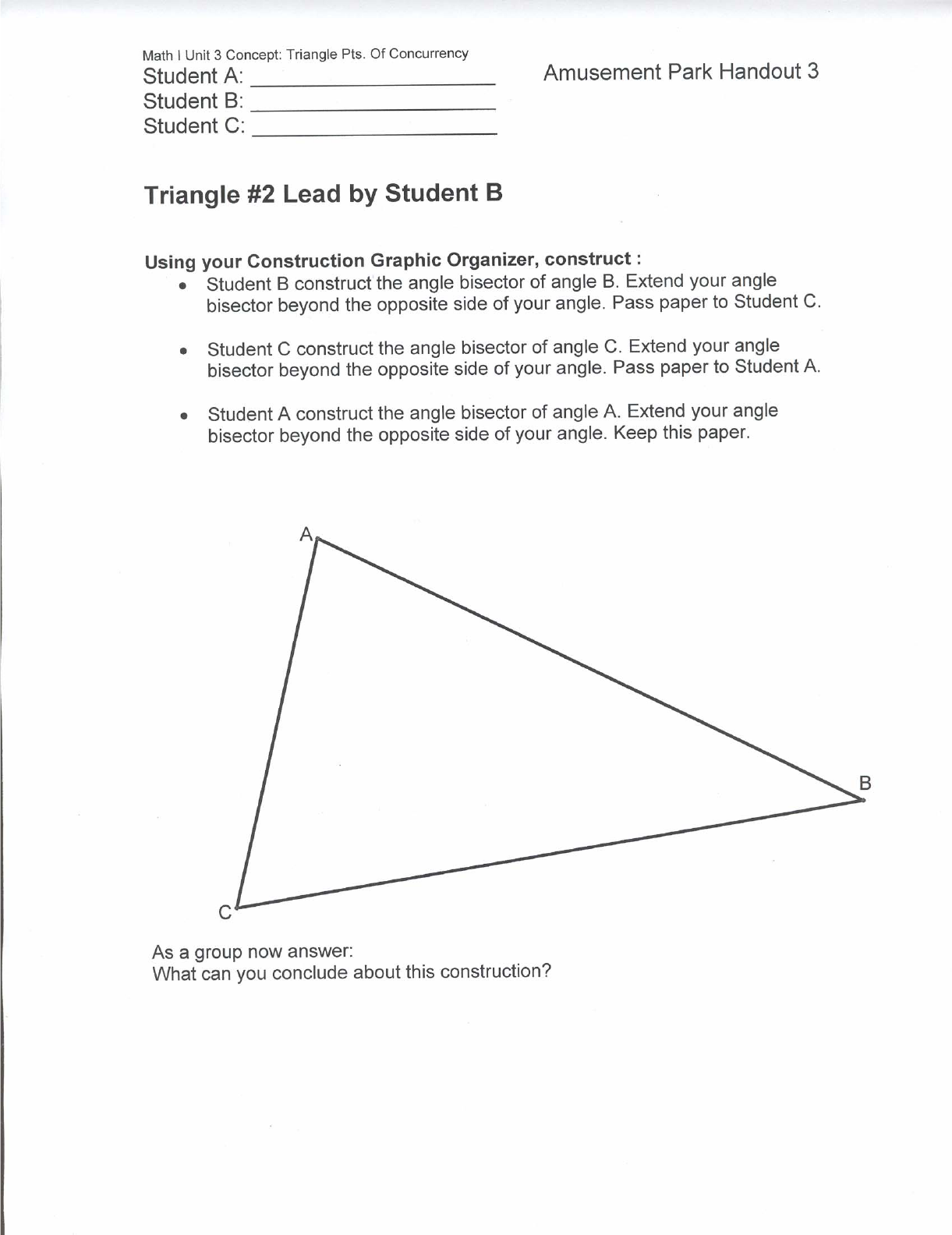
Math I Unit 3 Geometry © 2005 Learning Concepts Math I Unit 3 Geometry © 2005 Learning Concepts

Math I Unit 3 Geometry © 2005 Learning Concepts Math I Unit 3 Geometry © 2005 Learning Concepts
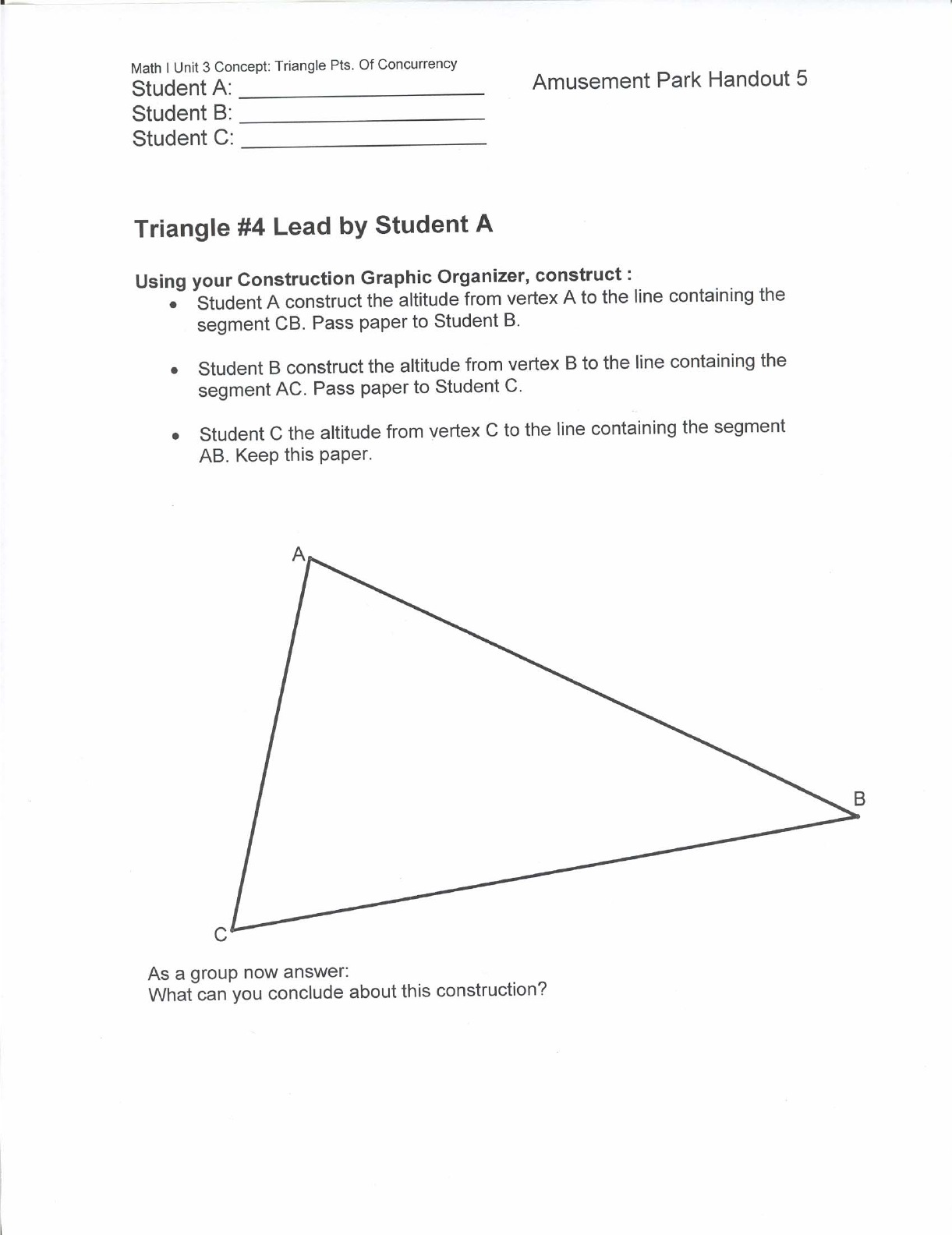
Math I Unit 3 Geometry © 2005 Learning Concepts Math I Unit 3 Geometry © 2005 Learning Concepts

Math I Unit 3 Geometry © 2005 Learning Concepts Math I Unit 3 Geometry © 2005 Learning Concepts

Math I Unit 3 Geometry © 2005 Learning Concepts Math I Unit 3 Geometry © 2005 Learning Concepts

Math I Unit 3 Geometry © 2005 Learning Concepts Math I Unit 3 Geometry © 2005 Learning Concepts

Math I Unit 3 Geometry © 2005 Learning Concepts
Points of Concurrency in a Triangle Summary Activity / Review
Unit 3
Concurrency of Altitides of a Triangle: The lines containing the altitudes of a triangle are concurrent.
• The point of concurrency of the altitudes of a triangle is called the _____________________(1).
Concurrency of Angle Bisectors of a Triangle: The angle bisectors of a triangle intersect at a point that is
equidistant from the sides of the triangle.
• The point of concurrency of the angle bisectors of a triangle is called the ________________(2).
Concurrency of Medians of a Triangle: The medians of a triangle intersect at a point that is two thirds of the
distance from each vertex to the midpoint of the opposite side.
• The point of concurrency of the medians of a triangle is called the ______________________(3). This
point is sometimes referred to as the “weighted center” or balancing point of a triangle.
Concurrency of Perpendicular Bisectors of a Triangle: The perpendicular bisectors of a triangle are
concurrent.
• The point of concurrency of the perpendicular bisectors of a triangle is called the
_____________________(4).
(5). Find the coordinates of the centroid O of ABC with coordinates A(-7, -4), B(-3, 5), C(1, -4).
Centroid: ____________________
(6). Find the coordinates of the incenter P of DEF with coordinates D(0, 6), E(4, -4), F(-5, -5).
Incenter: _________________________
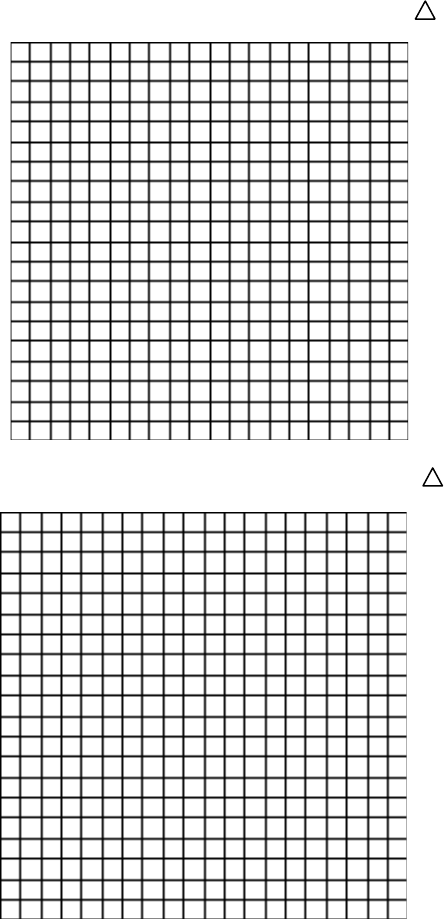
Math I Unit 3 Geometry © 2005 Learning Concepts
(7). Find the coordinates of the orthocenter Q of GHI with coordinates G(0, 0), H(3, 7), F(8, 3).
Orthocenter: ________________________
(8). Find the coordinates of the circumcenter R or JKL with coordinates J(0, 1), K(3, 4), L(6, 0).
Circumcenter: ________________________
